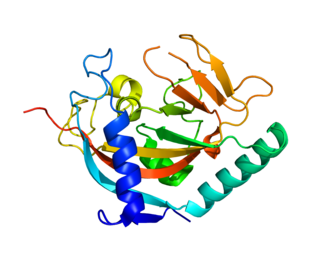 W
WH/ACA ribonucleoprotein complex subunit 4 is a protein that in humans is encoded by the gene DKC1.
 W
WThe jumping translocation breakpoint protein (JTB), also known as prostate androgen-regulated protein (PAR), is a protein that in humans is encoded by the JTB gene. It is an orphan receptor with unknown function.
 W
WIn molecular biology, the kinase binding protein CGI-121 family of proteins includes the kinase binding protein CGI-121 and its homologues. CGI-121 has been shown to bind to the p53-related protein kinase (PRPK). CGI-121 is part of a conserved protein complex, KEOPS. The KEOPS complex is involved in telomere uncapping and telomere elongation. This family of proteins also include archaeal homologues.
 W
WTankyrase, also known as tankyrase 1, is an enzyme that in humans is encoded by the TNKS gene. It inhibits the binding of TERF1 to telomeric DNA.
 W
WTelomere length regulation protein TEL2 homolog is a protein that in humans is encoded by the TELO2 gene.
 W
WTelomerase, also called terminal transferase, is a ribonucleoprotein that adds a species-dependent telomere repeat sequence to the 3' end of telomeres. A telomere is a region of repetitive sequences at each end of the chromosomes of most eukaryotes. Telomeres protect the end of the chromosome from DNA damage or from fusion with neighbouring chromosomes. The fruit fly Drosophila melanogaster lacks telomerase, but instead uses retrotransposons to maintain telomeres.
 W
WTelomerase reverse transcriptase is a catalytic subunit of the enzyme telomerase, which, together with the telomerase RNA component (TERC), comprises the most important unit of the telomerase complex.
 W
WTelomeric repeat-containing RNA (TERRA) is a long non-coding RNA transcribed from telomeres - repetitive nucleotide regions found on the ends of chromosomes that function to protect DNA from deterioration or fusion with neighboring chromosomes. TERRA has been shown to be ubiquitously expressed in almost all cell types containing linear chromosomes - including humans, mice, and yeasts. While the exact function of TERRA is still an active area of research, it is generally believed to play a role in regulating telomerase activity as well as maintaining the heterochromatic state at the ends of chromosomes. TERRA interaction with other associated telomeric proteins has also been shown to help regulate telomere integrity in a length-dependent manner.
 W
WTERF1-interacting nuclear factor 2 is a protein that in humans is encoded by the TINF2 gene. TIN2 is a component of the shelterin protein complex found at the end of telomeres.